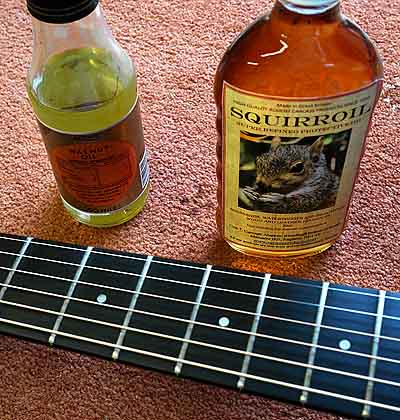Oiling fingerboards
Over the last week I’ve been reminded about the importance of oiling ebony fingerboards.
Ebony is a very dry wood which can readily absorb moisture from (and lose moisture to) the atmosphere. When this happens the ebony can expand or shrink more than the neck wood and thus bend it back or pull it forward. Much as a bi-metal strip bends at different temperatures.
The problem can be solved by oiling the fingerboard. This gives it a water resistant layer which inhibits the take-up or loss of moisture.
For many years I used lemon oil for this, but the latest acid-catalyst lacquer is not resistant to it, as were earlier versions.
If you were lucky enough to obtain a bottle of Squirroil (the manufacturers of which seem to have disappeared), this is ideal. Otherwise I use walnut oil, a light oil which penetrates the ebony to some extent. I would also expect proprietory brands of guitar fingerboard oil to be effective.
Rosewood contains more oil, so should not be as likely to suffer this problem. Not that oiling rosewood fingerboards can do any harm.
This issue re-surfaced a week or so ago when a guitarist in the south of France called and said that after over a year of a completely stable neck, it had pulled back to the point of serious string buzz. This was just after the start of a period of heavy rain and humidity.
While adjusting the truss rod solved his problem, another change in atmospheric humidity would almost certainly require him to reverse this adjustment. Proofing the fingerboard on a regular basis should be a better long term solution.

